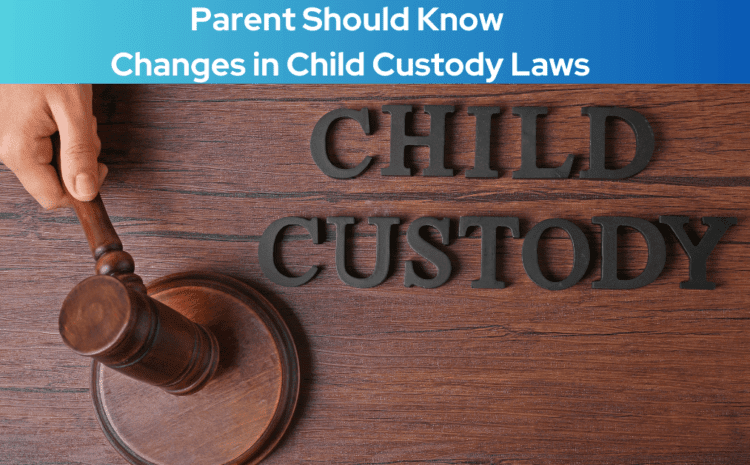
Traditionally fathers were considered to be the sole guardians of the person and property of the child, when mothers did not have an independent legal status. When mothers started to have an independent legal existence, when divorce became possible they could have their residence. This led Mothers also claim the custody of their children, which was recognised by the courts under certain circumstances.
However, the right of the father over the child remained supreme. Under the parens patriae jurisdiction where the courts considered the state to have even higher parental authority, which superseded the natural guardianship of the father and awarded custody depending upon what promoted the welfare of the child. Further, the legislation made by the parliament also aided in considering the welfare of the child.
The 257th report of the Law Commission of India in May 2015 on Reforms in Guardianship & Custody Laws in India recommended several legislative amendments to emphasize the “welfare of the child” as the paramount consideration in adjudicating custody and guardianship matters. The worst affected in proceedings of divorce and family breakdowns are the children.
Maintaining the central importance of the welfare of the child in proceedings of custody will help ensure that the child’s future is safe and protected, regardless of changing familial circumstances. The same report also gave an elaborate explanation of the International Approach to Joint Custody and decisions made by the courts in India using the same approach.
Post the Law Commission Report, the Central Government had invited comments from State Governments on whether new legislation needed to be framed to facilitate joint custody of children in divorced families.
- “Child custody orders cannot be made rigid and are capable of being altered at any time keeping in mind the needs and welfare of the child at various stages of life”, the Bombay High Court said.
Parents need to keep an eye on the details of the legal part to ensure that they have clarity about the updates in the current law. A lack of legal knowledge can jeopardize your chances of getting custody of your child and even lengthen the entire process.
The child-custody cases are complex and seeking professional advice is the best way to ensure an upper hand in the case.
Legal Terms Related To Child Custody
Before going into the depths of child custody laws, there are some custody terms to take note of as each term has specific legal meaning and rights associated with custody.
Legal custody
In this type of custody the legal custodian is allowed to make all major decisions in their child’s life, such as medical treatment, and educational choices, especially if the divorce was a messy battle.
Sole custody
Only one parent is given the right to take care of the child due to reasons deemed apt by the court.
Physical Custody
This allows one of the parents to keep the child with them and the other parent can make periodic visits, enabling stability and routine for the child.
Joint custody
As the name suggests both parents gain equal opportunity to spend time with the child and have equal opportunities to make decisions for the child.
Things to Know About Changes in Child Custody Laws
A child custody plea can be filed in any of the following cases:
Divorce, annulment of marriage, separation, adoption, or parental death.
In India, we have different legislations catering to different religions on matters like marriage, divorce, child custody, succession, and other related matters. For Child Custody matters the
legislations referred to are the Guardians & Wards Act, 1890, Hindu Minority and Guardianship Act, 1956, Section 26 of the Hindu Marriage Act 1955, Section 38 of the Special Marriage Act 1954, Hindu Minority and Guardianship Act 1956, and Section 41 of the Divorce Act, 1869
In all these, the Child custody laws have come full circle. The custody rights earlier were ‘Parens Patriae’, which permited the state, power, and authority to protect individuals who are deemed legally unable to act on their own. It then shifted to natural guardians’ rights i.e. the Parents had the right to appeal for custody of the child. Now the focus is on the ‘Welfare of the Child’ while granting custody.
Keeping child welfare as a top priority, some traditional laws have been reformed to give way to stronger and more inclusive ones.
- The law commission had taken up the psychological and emotional upheaval that prolonged cases bring to the child. In its report ‘Reforms in Guardianship and Custody Laws in India’, the commission had asked for the child’s welfare to be the top priority when taking any decision relating to custody. It also lays out a framework for awarding joint custody of the child whenever it is possible.
- The age-old gender biases are asked to be eliminated from two pieces of legislature, the Hindu Minorities and Guardians Act, 1956, and the Guardians and Wards Act, 1890.
- The Hindu Minority and Guardianship Act 1956 states that the mother is the legal guardian and the custodian of the child till the age of five.
- This is under the condition that the mother is fit and can take care of the child.
- In cases of children above the age of 5 years, the court shall decide on the facts presented before it, considering the welfare of the child being paramount.
- Having said that, various factors are taken into when deciding child custody like the age of the child, gender of the child, child’s willingness to be with that parent or not, physical and emotional needs of the child, and finances of the parents.
- Through various judgments, the trial courts, High Courts, and Supreme Court have always upheld the need to consider the welfare of the child to be of importance rather than the personal or legal right of the parent.
- A few other factors that can turn decisions are the financial, mental, and social well-being of the parents. These help in estimating if the parents can provide quality education and take care of the basic needs of the child.
- A one-time decision on custody is not considered as a permanent arrangement and a regular review and modification process is undertaken to ensure that the child has found the new arrangements comfortable.
A child needs a steady environment with set routines. Parents applying for child custody must remember that a change in custody might happen if the child isn’t considered to be having a normal childhood.
The child’s mental, emotional, and physical state is greatly affected in the legal process and it’s best to ensure that the proceedings run smoothly without conflict and delay. Individuals need to get professional help from the best lawyers who are aware of these changes so that their case has a stronghold in the court of law.

Advocate Kiran S R – A highly skilled, passionate, dedicated advocate, with vast wealth of knowledge, professionalism, ethical approach and expert skills. One of the sharpest legal mindset brings the best principles of legal practice to the forefront. A qualified Engineer turned Advocate. His passion, dedication and vision to help and assist his clients achieve the best results is his driving force.

